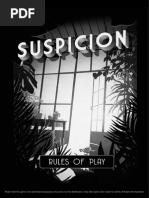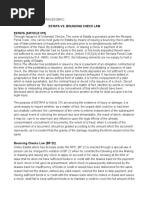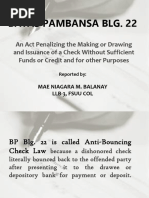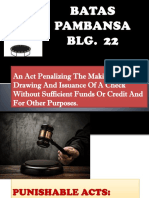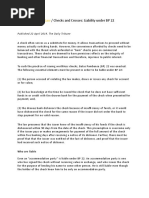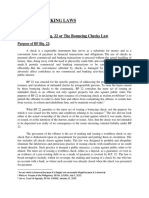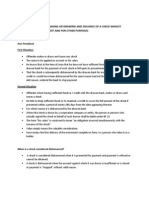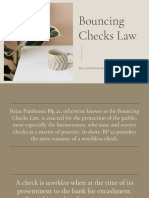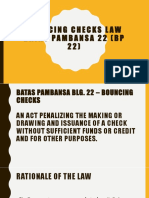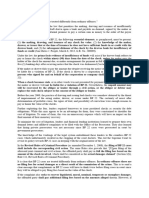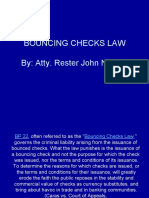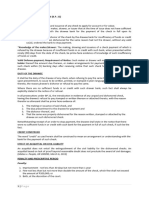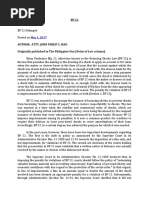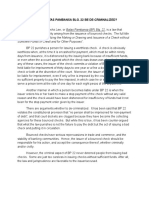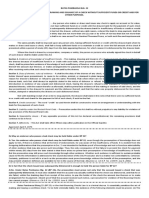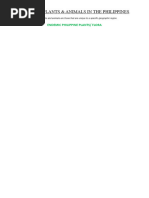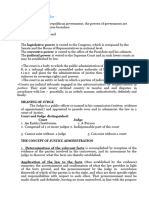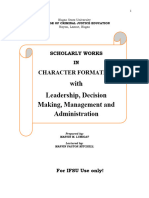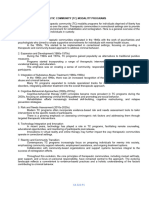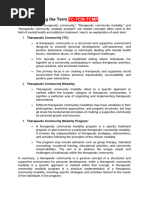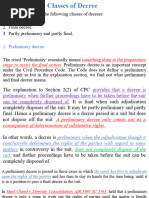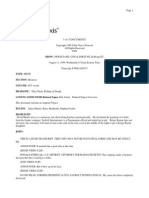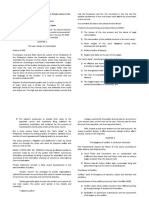0 ratings0% found this document useful (0 votes)
7 viewsBP 22
BP 22
Uploaded by
Greely Mae GumunotThis document summarizes the key points of Batas Pambansa Blg. 22, also known as the Bouncing Checks Law. The law makes it a criminal offense to issue checks that are subsequently dishonored due to insufficient funds. It aims to deter fraudulent check practices and promote financial accountability. Under the law, knowingly issuing a check without sufficient funds to cover it is a criminal offense punishable by imprisonment, fines, or both. The document outlines the elements of the crime, possible defenses, related legal circulars, and interactions with other laws like estafa.
Copyright:
© All Rights Reserved
Available Formats
Download as PPTX, PDF, TXT or read online from Scribd
BP 22
BP 22
Uploaded by
Greely Mae Gumunot0 ratings0% found this document useful (0 votes)
7 views18 pagesThis document summarizes the key points of Batas Pambansa Blg. 22, also known as the Bouncing Checks Law. The law makes it a criminal offense to issue checks that are subsequently dishonored due to insufficient funds. It aims to deter fraudulent check practices and promote financial accountability. Under the law, knowingly issuing a check without sufficient funds to cover it is a criminal offense punishable by imprisonment, fines, or both. The document outlines the elements of the crime, possible defenses, related legal circulars, and interactions with other laws like estafa.
Original Title
BP-22
Copyright
© © All Rights Reserved
Available Formats
PPTX, PDF, TXT or read online from Scribd
Share this document
Did you find this document useful?
Is this content inappropriate?
This document summarizes the key points of Batas Pambansa Blg. 22, also known as the Bouncing Checks Law. The law makes it a criminal offense to issue checks that are subsequently dishonored due to insufficient funds. It aims to deter fraudulent check practices and promote financial accountability. Under the law, knowingly issuing a check without sufficient funds to cover it is a criminal offense punishable by imprisonment, fines, or both. The document outlines the elements of the crime, possible defenses, related legal circulars, and interactions with other laws like estafa.
Copyright:
© All Rights Reserved
Available Formats
Download as PPTX, PDF, TXT or read online from Scribd
Download as pptx, pdf, or txt
0 ratings0% found this document useful (0 votes)
7 views18 pagesBP 22
BP 22
Uploaded by
Greely Mae GumunotThis document summarizes the key points of Batas Pambansa Blg. 22, also known as the Bouncing Checks Law. The law makes it a criminal offense to issue checks that are subsequently dishonored due to insufficient funds. It aims to deter fraudulent check practices and promote financial accountability. Under the law, knowingly issuing a check without sufficient funds to cover it is a criminal offense punishable by imprisonment, fines, or both. The document outlines the elements of the crime, possible defenses, related legal circulars, and interactions with other laws like estafa.
Copyright:
© All Rights Reserved
Available Formats
Download as PPTX, PDF, TXT or read online from Scribd
Download as pptx, pdf, or txt
You are on page 1of 18
BATAS PAMBANSA BLG.
22, April 03,
1979
AN ACT PENALIZING THE MAKING OR
DRAWING AND ISSUANCE OF A CHECK
WITHOUT SUFFICIENT FUNDS OR
CREDIT AND FOR OTHER PURPOSES.
Batas Pambansa Blg. 22
also known as the
Bouncing Checks Law.
BP 22 is a law that specifically deals
with the criminal offense of issuing
bouncing checks. Under this law, any
person who issues a check that is
subsequently dishonored upon
presentation due to insufficient funds,
closed account, or other valid reasons,
may be held liable for violating BP 22.
The law serves as a deterrent against
fraudulent practices involving checks
and promotes financial accountability.
The essential elements of the crime of BP 22 are:
a. the accused is the issuer who signed the dishonored check and the check is
issued for account or for value;
b. the accused has knowledge at the time he issued the check that the bank account
against which the check is issued has insufficient funds in or credit with the bank
for the payment of the check when presented for payment; and
c. the drawee bank dishonors the check because of insufficiency of funds, or it
would have dishonored the check for the same reason if the issuer did not order the
bank to stop payment for no valid reason
The law presumes that the issuer knew of the
insufficiency of his funds if the check is
dishonored within 90 days from the date of the
check. This presumption is overcome only if the
issuer pays or makes arrangements for payment of
the full amount of the check within five banking
days after receiving a notice of its dishonor .
Duty of drawee; rules of evidence.
PENALTY
• imprisonment of not less than thirty days but not
more than one (1) year
• or by a fine of not less than but not more than double
the amount of the check which fine shall in no case
exceed Two Hundred Thousand Pesos, or both such
fine and imprisonment at the discretion of the court.
Administrative Circular Nos. 12-2000 and 13-01 on the
imposition of a fine only, and not imprisonment, for
violations of BP 22.
The second, decisions of the courts holding that the
prosecution in BP 22 must establish that a written notice
of dishonor was actually received by the person who
issued the dishonored check.
The Supreme Court in its Administrative Circular No.
12-2000 declared that, in imposing the penalty for
violations of BP 22, courts should follow the policy of
“redeeming valuable human material and preventing
unnecessary deprivation of personal liberty and
economic usefulness with due regard to the protection
of the social order.”
In that regard, in lieu of
imprisonment, a fine equal to double
the amount of the check involved has
been deemed an appropriate penalty
for a violation of BP 22
Administrative Circular No. 13-01, the
Supreme Court clarified that it did not intend
to remove the penalty of imprisonment, but
that courts should reserve the imposition of
imprisonment as a penalty for serious cases
when the violation of BP 22 was committed
in such a way it would negatively affect the
social order
Possible defenses in an indictment include
1) payment of the value of the dishonored check within five banking days
from receipt of the notice of dishonor;
2) payment of the value of the check before filing of the criminal case in
court;
3) failure to serve a written notice of dishonor of the check to the issuer;
4) novation or change in the underlying obligation of the parties before the
filing of the criminal case in court;
5) a stop payment order pursuant to a valid reason such as non-delivery of
goods or services; and
6) knowledge by the payee that the check was not supported by sufficient
funds when the issuer issued the check.
P
rosecution under BP 22 is not a bar fo
r prosecution for
Estafa
, and the issuer of the check may be h
eld liable for one or both crimes, singl
y or simultaneously when the complai
nts are filed
in separate courts.
Even an “accommodation party” is liable under BP 22. An accommodation party is
one who has signed the check without receiving value in exchange, and who issues
the check for the purpose of lending his name to some other person. He is still liable
even though the holder of the check knew him to be only an accommodation party.
In case a check is issued in behalf of a corporation or other legal entity, the person
who actually signed the bounced check is liable.
It must also be noted that a person liable for BP 22 may at the same time be liable
for estafa under Article 315 (2-d) of the Revised Penal Code.
• A. a check is postdated or issued in payment of an obligation contracted at the
time the check is issued;
• B. lack or insufficiency of funds to cover the check;
C. damage to the payee thereof. It is the deceit or fraud attendant to the issuance
of the check which is punished.
D. Prima facie evidence of deceit exists by law upon proof that the drawer of the
check failed to deposit the amount necessary to cover his check within three days
from receipt of the notice of dishonor. The key issue is whether the complainant
would have parted with his money, property or any other object of the transaction
were it not for the issuance of the check, which turns out to be unfunded.
You might also like
- Box Like The ProsDocument232 pagesBox Like The ProsTee Vito Bierria Jr93% (30)
- Ante-Chaotic Age and Lucifer SinDocument13 pagesAnte-Chaotic Age and Lucifer SinAsemota Oghogho100% (7)
- My Attempt To Get Discovery On A Speeding TicketDocument12 pagesMy Attempt To Get Discovery On A Speeding TicketPaul GowderNo ratings yet
- The 5 Elements of the Highly Effective Debt Collector: How to Become a Top Performing Debt Collector in Less Than 30 Days!!! the Powerful Training System for Developing Efficient, Effective & Top Performing Debt CollectorsFrom EverandThe 5 Elements of the Highly Effective Debt Collector: How to Become a Top Performing Debt Collector in Less Than 30 Days!!! the Powerful Training System for Developing Efficient, Effective & Top Performing Debt CollectorsRating: 5 out of 5 stars5/5 (1)
- Suspicion Rules of PlayDocument8 pagesSuspicion Rules of PlayRoland MacDonaldNo ratings yet
- Bouncinf Check Law (BP 22) vs. Estafa (Art. 315)Document2 pagesBouncinf Check Law (BP 22) vs. Estafa (Art. 315)edrianclyde100% (2)
- Bautista v. CADocument2 pagesBautista v. CAAthena BlakeNo ratings yet
- Bp-22 and PD 1689Document64 pagesBp-22 and PD 1689Mae Niagara100% (1)
- BP 22 NotesDocument5 pagesBP 22 NotesBetson Cajayon100% (1)
- Annotated BibliographyDocument2 pagesAnnotated Bibliographyapi-488878401No ratings yet
- Report MidtermDocument2 pagesReport MidtermkristenaNo ratings yet
- An Act Penalizing The Making or Drawing and Issuance of A Check Without Sufficient Funds or Credit and For Other PurposesDocument69 pagesAn Act Penalizing The Making or Drawing and Issuance of A Check Without Sufficient Funds or Credit and For Other PurposesHermay BanarioNo ratings yet
- Check BP 22Document2 pagesCheck BP 22Imba SkyNo ratings yet
- BP Blg. 22Document30 pagesBP Blg. 22Dee LMNo ratings yet
- Notes On Banking Laws: BP Blg. 22 or The Bouncing Checks LawDocument55 pagesNotes On Banking Laws: BP Blg. 22 or The Bouncing Checks LawJelliane de la CruzNo ratings yet
- PUP Banking LawsDocument57 pagesPUP Banking LawsCharsen MagallonesNo ratings yet
- Philippines Banking Law (Law3033)Document55 pagesPhilippines Banking Law (Law3033)Nestor Tulang JrNo ratings yet
- BP 22 and EstafaDocument7 pagesBP 22 and EstafaStefhanie Khristine PormanesNo ratings yet
- Notes On BP 22Document3 pagesNotes On BP 22Harold-Marjorie EstacioNo ratings yet
- BP22Document62 pagesBP22PhilipBrentMorales-MartirezCariagaNo ratings yet
- Batas Pambansa BLG 22 - SPLDocument6 pagesBatas Pambansa BLG 22 - SPLSamantha VelosoNo ratings yet
- Bouncing Checks LawDocument11 pagesBouncing Checks Lawzyphora grace trillanes100% (1)
- EstafaDocument2 pagesEstafaKaye Kiikai OnahonNo ratings yet
- Batas Pambansa Blg. 22Document7 pagesBatas Pambansa Blg. 22charmssatellNo ratings yet
- Bouncing CheckDocument4 pagesBouncing CheckBenitez GheroldNo ratings yet
- Bouncing Checks and Insurance LawDocument7 pagesBouncing Checks and Insurance Lawiveyzel quitanNo ratings yet
- BP 22 Bouncing Checks LawDocument4 pagesBP 22 Bouncing Checks LawWilsonNo ratings yet
- Resterio Vs People of The Philippines G.R. No. 177438 September 24, 2012 FactsDocument3 pagesResterio Vs People of The Philippines G.R. No. 177438 September 24, 2012 FactsGyout tyiiNo ratings yet
- HandoutDocument2 pagesHandoutJessica Astronomia AningatNo ratings yet
- Lozano vs. MartinezDocument3 pagesLozano vs. MartinezEra GasperNo ratings yet
- Batas Pambansa Blg. 22Document2 pagesBatas Pambansa Blg. 22Avianne VillanuevaNo ratings yet
- M1 - Bouncing Checks LawDocument23 pagesM1 - Bouncing Checks LawJaycy FernandoNo ratings yet
- BP 22 DiscussionDocument8 pagesBP 22 DiscussionTrinca DiplomaNo ratings yet
- (BP 22 Sec. 2 Pg. 356 in The Book)Document6 pages(BP 22 Sec. 2 Pg. 356 in The Book)Kyanna Mae LecarosNo ratings yet
- BP 22 - 12 7 2022Document23 pagesBP 22 - 12 7 2022Marcos DmitriNo ratings yet
- Bp22 - Bouncing Checks LawDocument9 pagesBp22 - Bouncing Checks Lawjusang16100% (1)
- BP 22Document32 pagesBP 22Shyrie ClaireNo ratings yet
- BP 22 For NewbiesDocument2 pagesBP 22 For NewbiesBryan Angelo BayauaNo ratings yet
- Topic Bouncing Checks LawDocument29 pagesTopic Bouncing Checks LawAtty Rester John NonatoNo ratings yet
- Domagsang v. CA and The PeopleDocument4 pagesDomagsang v. CA and The PeopleAntonJohnVincentFriasNo ratings yet
- Anti-Bouncing Checks LawDocument2 pagesAnti-Bouncing Checks LawPamela Daneth AgondezNo ratings yet
- BP 22 Nego NotesDocument5 pagesBP 22 Nego NotesAnna Lesava100% (2)
- Notes On BP22 Atty. DomingoDocument2 pagesNotes On BP22 Atty. Domingothalia alfaroNo ratings yet
- Homework #1 Bouncing Checks LawDocument4 pagesHomework #1 Bouncing Checks LawKimberly Jean LautrizoNo ratings yet
- BP 22Document20 pagesBP 22AJ SantosNo ratings yet
- Batas Pambansa Blg.22Document10 pagesBatas Pambansa Blg.22Mavz PelonesNo ratings yet
- Bp22 - Criminal Law Special Penal Laws Bouncing Checks Law (BP BLG 22) Plus Administrative Circular No 12-2000 & Administrative Circular No 13-2001 Re Clarification of Admin Circular No 12-20Document5 pagesBp22 - Criminal Law Special Penal Laws Bouncing Checks Law (BP BLG 22) Plus Administrative Circular No 12-2000 & Administrative Circular No 13-2001 Re Clarification of Admin Circular No 12-20jusang16No ratings yet
- Batas Pambansa BLG 22Document19 pagesBatas Pambansa BLG 22JS DSNo ratings yet
- Anti Bouncing Checks Law Batas Pambansa Blg. 22Document1 pageAnti Bouncing Checks Law Batas Pambansa Blg. 22MarkNo ratings yet
- Review of The Accounting ProcessDocument10 pagesReview of The Accounting ProcessJulzNo ratings yet
- Batas Pambansa Blg. 22: Annotated: Section 1. Checks Without Sufficient Funds. - Any Person Who Makes or DrawsDocument11 pagesBatas Pambansa Blg. 22: Annotated: Section 1. Checks Without Sufficient Funds. - Any Person Who Makes or DrawsJomarco SantosNo ratings yet
- Bouncing Check Law BP Bldg. 22: Prof. Joshua S. Umali, CPADocument10 pagesBouncing Check Law BP Bldg. 22: Prof. Joshua S. Umali, CPAJoshua UmaliNo ratings yet
- Bouncing Check Law Bp22Document2 pagesBouncing Check Law Bp22nicolaus copernicus100% (1)
- Should Batas Pambansa BLGDocument1 pageShould Batas Pambansa BLGCharmaine GraceNo ratings yet
- Bp22 - Distinction Between Estafa and BP 22Document1 pageBp22 - Distinction Between Estafa and BP 22jusang16100% (1)
- Batas Pambansa BLG 22Document3 pagesBatas Pambansa BLG 22Nikko SterlingNo ratings yet
- BP 22Document10 pagesBP 22Glenn TaduranNo ratings yet
- Bouncing Check LawDocument6 pagesBouncing Check LawMiltoniusKNo ratings yet
- BP 22 Defanged: Author: Atty. John Philip C. Siao Originally Published in The Philippine Star (Point of Law Column)Document6 pagesBP 22 Defanged: Author: Atty. John Philip C. Siao Originally Published in The Philippine Star (Point of Law Column)Dhanica PanganibanNo ratings yet
- PaperDocument42 pagesPaperfocusedkheyNo ratings yet
- BP 22Document3 pagesBP 22Cayen Cervancia CabiguenNo ratings yet
- Bouncing Checks (BP 22) : An Extended DiscussionDocument3 pagesBouncing Checks (BP 22) : An Extended DiscussionmabzkieNo ratings yet
- BP 22 (Bouncing Checks Law)Document3 pagesBP 22 (Bouncing Checks Law)toshkenbergNo ratings yet
- Introduction to Negotiable Instruments: As per Indian LawsFrom EverandIntroduction to Negotiable Instruments: As per Indian LawsRating: 5 out of 5 stars5/5 (1)
- endemicFLORAFAUNA LongDocument10 pagesendemicFLORAFAUNA LongGreely Mae GumunotNo ratings yet
- Chapter 2 CFDocument43 pagesChapter 2 CFGreely Mae GumunotNo ratings yet
- Chapter 3Document13 pagesChapter 3Greely Mae GumunotNo ratings yet
- Chapter 1 General ConceptDocument16 pagesChapter 1 General ConceptGreely Mae GumunotNo ratings yet
- Cordillera Justice SystemDocument42 pagesCordillera Justice SystemGreely Mae GumunotNo ratings yet
- Chapter 1-3Document23 pagesChapter 1-3Greely Mae GumunotNo ratings yet
- Character Formation Chapter 7Document5 pagesCharacter Formation Chapter 7Greely Mae GumunotNo ratings yet
- Chapter 2Document5 pagesChapter 2Greely Mae GumunotNo ratings yet
- Week 2Document4 pagesWeek 2Greely Mae GumunotNo ratings yet
- learning-material-in-Human-Behavior (AutoRecovered)Document43 pageslearning-material-in-Human-Behavior (AutoRecovered)Greely Mae GumunotNo ratings yet
- Chapter 6Document154 pagesChapter 6Greely Mae GumunotNo ratings yet
- Character Formation With Leadership Decision Making Management and AdministrationDocument142 pagesCharacter Formation With Leadership Decision Making Management and AdministrationGreely Mae GumunotNo ratings yet
- Local Media7837237402835500226Document27 pagesLocal Media7837237402835500226Greely Mae GumunotNo ratings yet
- TC Evo PDL CICLDocument3 pagesTC Evo PDL CICLGreely Mae GumunotNo ratings yet
- Understanding The Term TC TCM TCMPDocument2 pagesUnderstanding The Term TC TCM TCMPGreely Mae GumunotNo ratings yet
- Chapter 1 Nature of MathematicsDocument12 pagesChapter 1 Nature of MathematicsGreely Mae GumunotNo ratings yet
- UN Charter of HUMAN RIGHTSDocument6 pagesUN Charter of HUMAN RIGHTSHamza ShahidNo ratings yet
- EchoDocument1 pageEchoRollie AndradeNo ratings yet
- 4 Cyber TortsDocument21 pages4 Cyber TortsMahi NijhawanNo ratings yet
- Current Issues in Buddhism - Eric RaymondDocument5 pagesCurrent Issues in Buddhism - Eric RaymondkingkuttyNo ratings yet
- Burma Oil Company V Lord AdvocateDocument12 pagesBurma Oil Company V Lord Advocatesultan2mughal-1No ratings yet
- Unit 1 - Definition - Classes of DecreeDocument16 pagesUnit 1 - Definition - Classes of Decreemegha.9119marymichaelNo ratings yet
- Matilda PoemDocument6 pagesMatilda Poemgerge100% (1)
- Benigno Aquino IIIDocument18 pagesBenigno Aquino IIILilwayne HarderNo ratings yet
- Nps Thesis - Trolls or Threats - Challenges of Alt-Right Extremism To Local Law EnforcementDocument126 pagesNps Thesis - Trolls or Threats - Challenges of Alt-Right Extremism To Local Law Enforcementfuturegen9854No ratings yet
- OBLICON Situational ProblemsDocument3 pagesOBLICON Situational ProblemsMaxy BariactoNo ratings yet
- David Mead CNN StoryDocument9 pagesDavid Mead CNN StoryMike KoehlerNo ratings yet
- Web Telephony, LLC. v. Verizon Communications, Inc. Et Al - Document No. 63Document13 pagesWeb Telephony, LLC. v. Verizon Communications, Inc. Et Al - Document No. 63Justia.comNo ratings yet
- Indeterminate Sentence LawDocument25 pagesIndeterminate Sentence LawShiena Lou B. Amodia-RabacalNo ratings yet
- Sarla Verma vs. DCTDocument1 pageSarla Verma vs. DCTNikhilparakhNo ratings yet
- Forgiveness Is PossibleDocument11 pagesForgiveness Is PossibleUnited Church of God100% (1)
- Intercultural Studies I - MonarchyDocument11 pagesIntercultural Studies I - MonarchyagostinadeluchiNo ratings yet
- Aniledis Batista and Paul Sohayegh File Class Action in San JoseDocument20 pagesAniledis Batista and Paul Sohayegh File Class Action in San JoseJack PurcherNo ratings yet
- Noble Drew Ali: A Divine Warning To The NationsDocument3 pagesNoble Drew Ali: A Divine Warning To The Nationsbstvsn100% (3)
- Diversity Policy ExampleDocument2 pagesDiversity Policy Examplepanot8047No ratings yet
- Cuomo Administration Demand For Arbitration With SenecasDocument11 pagesCuomo Administration Demand For Arbitration With SenecasWGRZ-TVNo ratings yet
- Super BassDocument4 pagesSuper BassJay Ann Dome100% (1)
- Childrens Book AwardDocument3 pagesChildrens Book Awardapi-282225100No ratings yet
- TAXPAYER's REMEDIESDocument6 pagesTAXPAYER's REMEDIESAliyah SandersNo ratings yet
- Alternative Dispute Resolution ReviewerDocument13 pagesAlternative Dispute Resolution ReviewerEdwin Villa100% (2)
- The Mini ProblemDocument3 pagesThe Mini ProblemPorshothman ElenggovenNo ratings yet




